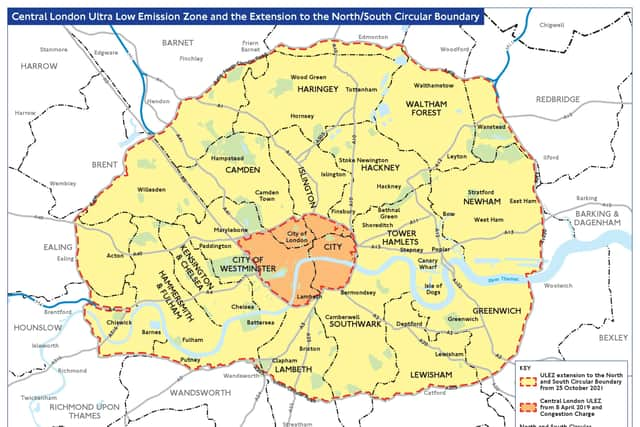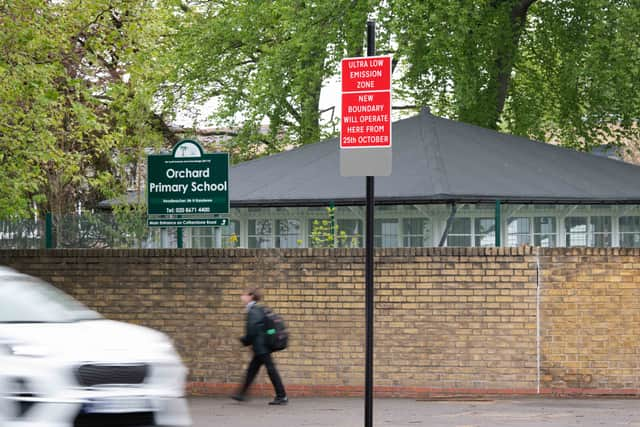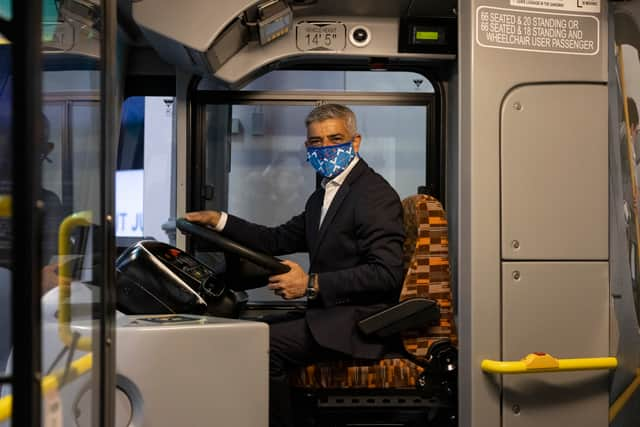Ultra Low Emission Zone: When is the London ULEZ extension and does my car meet emissions requirements?
and live on Freeview channel 276
London’s Ultra Low Emission Zone is set to expand in less than a week’s time as part of an action to clean up the city’s air.
Transport for London are urging motorists to check their vehicles to make sure they meet pollution standards.
Advertisement
Hide AdAdvertisement
Hide AdFrom charges to where the zone is expanding to, here is everything you need to know about the changes about to occur.
What is the ULEZ?
ULEZ stands for Ultra Low Emission Zone, a TfL scheme which aims to reduce the number of polluting cars on the road, improve London’s air quality and reduce pollution.
It introduces a charge for motorists with older diesel and petrol vehicles, which give off higher emissions.
The ULEZ currently covers the same area as the congestion zone, however this will be expanding on October 25.
Advertisement
Hide AdAdvertisement
Hide AdTfL hopes the zone will encourage Londoners to switch to cleaner vehicles or use public transport instead.


When is the expansion happening?
The expansion of London’s Ultra Low Emission Zone is beginning on October 25.
The new zone will cover all areas within the North Circular (A406) and South Circular (A205) roads and will be 18-times the size of the existing ULEZ.
It will run 24 hours, seven days a week, except Christmas Day.
Advertisement
Hide AdAdvertisement
Hide AdTfl has estimated that 100,000 cars, 35,000 vans and 3,000 lorries could potentially be affected by the tighter standards in the expanded area every day.
The new zone doesn’t include the North Circular and South Circular roads, so you can drive on the A406 and A205 roads themselves without being charged.
Does my car meet ULEZ standards?
To ensure that your vehicle complies with pollution standards, Tfl are asking motorists who haven’t done so already to verify their vehicle using their online vehicle checker.
Advertisement
Hide AdAdvertisement
Hide AdIt said: “Petrol cars that meet the ULEZ standards are generally those first registered with the DVLA after 2005, although cars that meet the standards have been available since 2001.
“Diesel cars that meet the standards are generally those first registered with the DVLA after September 2015.”


What will the ULEZ charges be if my car doesn’t meet the standards?
Advertisement
Hide AdAdvertisement
Hide AdFor motorists with older diesel or petrol vehicles they will have to pay a charge of £12.50 per day to drive in the zone.
So far, four in five vehicles in the zone already comply but TfL estimates there are 138,000 non-compliant vehicles registered within the area.
Where is the new zone expanding to?
From October 25, the ULEZ area will expand significantly covering all areas within the North Circular (A406) and South Circular (A205) roads.
As well as covering the City of London and Westminster as it has till now, it also covers the central boroughs of Camden, Islington, Haringey, Hackney, Kensington & Chelsea, Hammersmith & Fulham and Tower Hamlets in their entirety.
Advertisement
Hide AdAdvertisement
Hide AdThe boroughs of Southwark, Lambeth, Lewisham, Richmond, Hounslow, Ealing, Brent, Barnet, Enfield, Waltham Forest, Redbridge, Newham and Greenwich are also partly covered by the ULEZ.
The area however doesn’t include the North Circular and South Circular roads, so you can drive on the A406 and A205 roads themselves without being charged.


What is the Mayor of London saying?
Advertisement
Hide AdAdvertisement
Hide Ad“Our scrappage scheme will continue supporting motorists to ditch their polluting cars and make the switch to greener forms of transport as we drive towards a green recovery.”
What is TfL saying?
Alex Williams, TfL’s director of city planning, said: “The benefits of the larger ULEZ won’t just be felt from day one of its operation.
“Compliance with the tough standards has more than doubled since the Mayor announced the plans, with the result being Londoners breathing cleaner air over the last four years.
Advertisement
Hide AdAdvertisement
Hide Ad“We don’t want drivers to get caught out on the 25 October, so we are advising people to use our checker to see if their vehicle meets the standards.
“If they are liable for the charge we would ask them to consider using public transport, or to walk or cycle if possible, and if they need to drive, consider using a car club whose fleets are fully ULEZ compliant, or switching to the cleanest vehicle.”
Comment Guidelines
National World encourages reader discussion on our stories. User feedback, insights and back-and-forth exchanges add a rich layer of context to reporting. Please review our Community Guidelines before commenting.